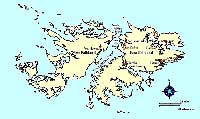
The Falklands or the Malvinas Islands
The Falklands War, or the Guerra de las Malvinas, depending on which side you choose, began on April 2, 1982. As the thirtieth anniversary of the war approaches, a war of worlds between the ex-combatants, the UK and Argentina, has escalated. Eggs and fresh vegetables are also running short on the island as as an Argentine trade embargo takes its toll.
Argentina’s foreign minister, Hector Timerman, has accused the UK of sending a nuclear-armed submarine to the South Atlantic and has made an official complaint to the UN over the Falklands dispute. As reported by the BBC, “Mr Timerman told a news conference at the UN in New York that the UK was “militarising the region”, repeating accusations made by Argentine President Cristina Fernandez de Kirchner earlier this week.
“Argentina has information that, within the framework of the recent British deployment in the Falklands, they sent a nuclear submarine with the capacity to transport nuclear weapons to the South Atlantic,” Mr Timerman said.”
Britain’s ambassador to the UN, Sir Mark Lyall Grant said the government did “not comment on the disposition of nuclear weapons, submarines etc”. He branded the idea that the UK was “militarising” the region “manifestly absurd”.
“Before 1982 there was a minimal defence presence in the Falkland Islands,” he said. “It is only because Argentina illegally invaded the Falkland Islands in 1982 that since then we had to increase our defence posture. Nothing has changed in that defence posture.”
Earlier this month, Prince William arrived in the Falkland Islands. Argentina has described the arrival of the Duke of Cambridge as a “provocation” and called him a “conqueror.” The British have described the Prince’s six-week RAF tour of duty as merely “routine”.
An economic embargo organized by Argentina is being felt by the residents of the Falklands. There are reports of a shortage of eggs and fresh vegetables.
Falkland Islands: A shortage of eggs
The editor of Penguin News – combining the two big stories of the prince and the fresh produce shortage – was in no doubt which she considered more germane to the life and wellbeing of the islanders.
“Were I to obtain an interview with the dashing young royal,” she wrote, “my first question might well be – did you bring any bananas?”
Thanks to Alaric Bond and Gareth Hughes for contributing articles to this post.

I believe “The Falklands War” is the correct description of the last conflict over the islands, given the fact that the British were the ultimate victors. The simple fact that the people living there wish to remain British citizens, and in view of British possession of the islands since 1833, is enough for me to say that these islands are British territory, not Argentine. Once again, a weak, corrupt regime in Buenos Aries is attempting to distract the Argentinian people from their governments shortcomings.
I read they Prince went down there on duty and problems started, but didn’t think this site would have an interest.
As a senior in college, one of my final papers concerned an aspect of naval warfare vis a viz to the Falklands conflict, which was then ongoing. My research led me to wonder why there was such a fuss in the first place over these islands, as they don’t seem very hospitable, and in fact are classified as Sub-Antarctic. Horrible weather, not much good farmland, etc. I have a small page with some philatelic content about the Falklands can be found at http://qsl.net/kg0yh/falkland.htm